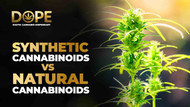Synthetic Cannabinoids vs Natural Cannabinoids: What’s the Difference?
May 21st 2025
Synthetic Cannabinoids vs Natural Cannabinoids: What’s the Difference? - Dope
Understanding Cannabinoids
Cannabinoids are active compounds found in the cannabis plant, responsible for many of its therapeutic and psychoactive effects. These include well-known compounds like THC (Tetrahydrocannabinol) and CBD (Cannabidiol) — both naturally occurring in cannabis natural varieties such as hemp and marijuana.
But not all cannabinoids are created equal. In recent years, synthetic cannabinoids have emerged — laboratory-made compounds that mimic the effects of natural cannabis but often come with very different safety profiles.
This brings us to an important question: Synthetic cannabinoids vs natural cannabinoids — what’s the real difference, and which is safer?
What Are Natural Cannabinoids?
Natural cannabinoids (also known as phytocannabinoids) occur naturally in the cannabis plant. There are over 100 natural cannabinoids identified so far, including:
-
THC (Tetrahydrocannabinol) – responsible for the psychoactive “high.”
-
CBD (Cannabidiol) – non-intoxicating, known for relaxation and anti-inflammatory benefits.
-
CBG, CBC, CBN – lesser-known cannabinoids that support mood, pain relief, and sleep.
These compounds interact with your body’s endocannabinoid system (ECS) — a biological network that helps regulate mood, pain, sleep, and immune response.
So, when you consume cannabis natural or hemp-derived products, you’re introducing plant-based compounds your body recognizes and can process naturally.
In short: Natural cannabinoids = organic, plant-derived compounds with potential health and therapeutic benefits.
What Are Synthetic Cannabinoids?
Synthetic cannabinoids are man-made chemicals designed to imitate the effects of THC or other cannabinoids. They are often sprayed onto herbs or sold as “Spice,” “K2,” or “synthetic weed.”
While some synthetic cannabinoids are developed for medical or research purposes, many unregulated versions sold online or on the street can be dangerous and unpredictable.
Synthetic cannabinoids interact with the same receptors as THC but in much stronger and less controlled ways, often leading to side effects such as:
-
Severe anxiety or paranoia
-
Rapid heart rate or high blood pressure
-
Hallucinations or confusion
-
Nausea and vomiting
-
In extreme cases, seizures or hospitalization
Synthetic Cannabinoids vs Natural Cannabinoids: Key Differences
| Feature | Natural Cannabinoids | Synthetic Cannabinoids |
|---|---|---|
| Source | Derived from cannabis plants (organic) | Created in labs (chemical) |
| Examples | THC, CBD, CBN, CBG | K2, Spice, JWH-018 |
| Psychoactive? | Depends on type (THC yes, CBD no) | Often highly psychoactive |
| Safety Profile | Generally well-tolerated | Can cause severe side effects |
| Legal Status | Legal if hemp-derived (≤0.3% THC) | Often illegal or restricted |
| Purpose | Therapeutic & recreational | Research or synthetic imitation |
Verdict:
When it comes to synthetic cannabinoids vs natural, natural is always safer and more predictable. The human body is designed to process natural cannabinoids — not synthetic chemicals that mimic them.
Is Marijuana Synthetic or Organic?
A common question is: “Is marijuana synthetic or organic?”
The answer is simple — marijuana is 100% natural, as it comes from the cannabis plant.
However, products labeled as synthetic marijuana are not real cannabis. They contain chemical substitutes that mimic THC but don’t provide the same balanced effects.
So, if you’re choosing between synthetic cannabinoids vs natural, always go for organic, plant-based cannabis products for safety and authenticity.
Is CBD Natural or Synthetic?
Another frequently asked question is: “Is CBD natural or synthetic?”
Most CBD products on the market today are natural, extracted from hemp plants using methods like CO₂ extraction.
However, some companies produce synthetic CBD in labs to mimic natural cannabidiol. While synthetic CBD may share a similar molecular structure, it lacks the natural plant compounds (terpenes, flavonoids, and minor cannabinoids) that contribute to the “entourage effect” — the synergistic boost that enhances real cannabis’ therapeutic power.
Tip: Always check labels and lab reports to ensure your CBD is hemp-derived, full-spectrum, and naturally sourced.
The Bottom Line: Choose Natural Over Synthetic
When comparing synthetic cannabinoids vs natural cannabinoids, the difference is clear:
-
Natural cannabinoids come from organic cannabis and support holistic wellness.
-
Synthetic cannabinoids are chemically engineered and may pose serious health risks.
If your goal is relaxation, pain management, or natural healing, always choose natural CBD or hemp-derived products. They’re safer, legal, and more effective — backed by both science and nature.

